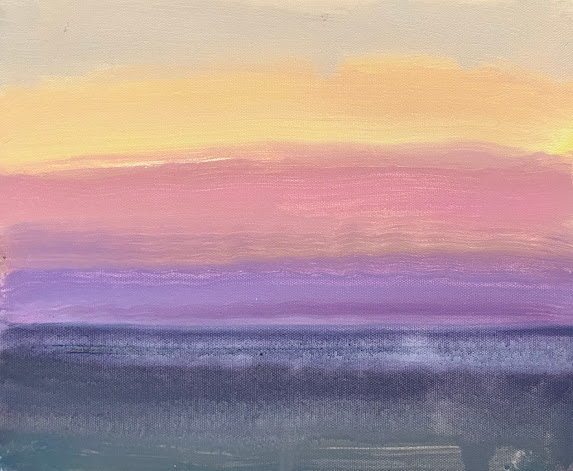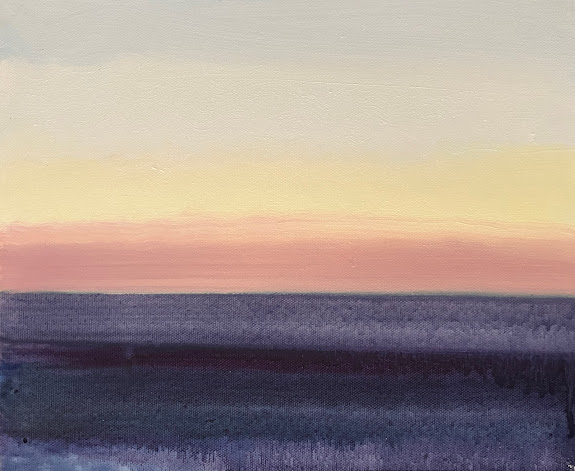Learning to paint is usually one of those purely enjoyable actions one takes up when someone has time o their hands. Like any creative endeavour it relies solely upon one's own personal understanding of themselves, a deeply individual feeling, sort of like a mapping of one's own creative DNA.
How one learns to paint is another matter. There are many avenues of course. Many people, (especially adults) tend to choose the way of technique, that is to say, learned from technical methods derived from systems largely created by others or institutions. (Think, the laborious copying of plaster casts of the 19th century) It is imposed upon a student later in life as easily as it's imposed upon young children who dutifully copy templates drawn by their teachers back in grade school.
The opposite of this 'training' is one where students develop a vision of their own, discreetly, and in their own time frame, usually through a teacher of unusually large artistic experience and sensibility.
And if the teacher is a good one, it requires patience from both student and teacher. It also means that the end results can never be understood in advance, it will almost always be a surprise to both.
This is also a process whereby the element of time will invariably be less important than the quality of the learning experience at hand because it can take a while.
Of course, there is technique in every creative act though the best ones are always hidden so thoroughly that only the artist himself could possibly decipher or decode them after the fact. And unlike technique, where there is vision, there is always the paradox of both mystery but clarity too.
What's my point?
Recently, a thought came to me about my own experience in school as a young child, one so contrary to the understanding I have developed later in life.
And it suddenly piqued my curiosity as to how and why I never understood the idea (as a child) of learning something as an exponential and empirical, ongoing experience.
From the stress of my own family life I had somehow developed the notion that each and every individual task, every exam, very paper assignment, and every bit of homework I had ever needed to accomplish, appeared to me as an iron door locked in place, as if by GOD himself. There was a password but this was handed out by GOD to only those really smart and diligent students.
In the event that I couldn't understand absolutely everything along the way, I was forbidden to advance further into the labyrinth and be condemned to a life of circular confusion, unable to finish a task. I was a shadow of Sisyphus.
What interests me today is why I didn't learn that secret that so many smarty pants seem to share about the art of learning as a process not a destination.
But what I have since learned is that each task or assignment is actually in fact, linked up to one another like a string of pearls. How was this isolated idea of pass/fail so radically imposed upon a young creative mind? When education become a vertical ascent instead of a horizontal hike?
I know I wasn't the only one whose learning ability was stunted by this almost Stalinist form of education. There must be whole armies of dysfunctional people out there, dejected, and still acting out in later life because they failed a book report in the second grade.
But I guess the past is gone and I should really be grateful to have made a switch in my thinking. I have murdered my conditioning.
But I do see it now that learning anything in life is a process like the endless ebb and flow of tidal waves at a beach and that I must learn to swim by just swimming, and that one little finger-painted picture in grade school was not a jump over the moon but just another dip in the pool.
What I learn so late in life from any and all of the these small pictures done at the beach is that these studies are connected to one another indeed like a pearl necklace. Yes, they may appear as still Polaroids but together, they that make up an unfinished film.
The key element of knowledge for me today is that I don’t have to understand 'everything' about 'everything' at this very moment in time. What I learn today has been part of an ongoing experience that may or may not be more resolved today, but regardless, it's a part of my whole life whether or I am complete or not.
If I could go back and say these kinds of things to myself 65 years ago, these are the kinds of things I would say.
And I suppose that one of the great things, among many, about being fathers and mothers is that they get to revisit themselves as children, through their own children. If they are lucky, they even get to correct, to some degree, their own early faulty perspectives about themselves. For me, I'm childless so I've come to this understanding from studying both Music and Painting as an adult.
Have I changed my outlook about how I learn these things? Yes of course. If I hadn't I would still be locked into an obsessive compulsive perfectionism, so a Psychologist once told me after a brief therapy.
So anyway, from a few weeks back are these four studies, three from the night of the 19th July, the last one from the following night on the 20th. I liked them at the time because they are still fresh. Sometimes, that is all one can say about a painting. One hopes it lives and breathes on its on power, and not on some form of life support propped up by a concept or a sentimental tug at the eyelids.
I have not been out for two weeks because I caught COVID but I seem to be on the mend now and hopefully when the weather clears up I will be able to get out to the beach and for fresh air.
In the meantime I sat at the piano for the first serious practice session since getting sick. To my greatest surprise everything was still there, somewhere inside me. I ran through six Satie pieces with barely a mistake. It was extremely weird almost as is it was someone else playing my fingers.
The lessons I take from this is that sometimes it's a good thing to pause both one's avocation and vocation from time to time. And to join the idea I presented earlier is to confirm everything I wrote about learning as a creative act.




No comments:
Post a Comment